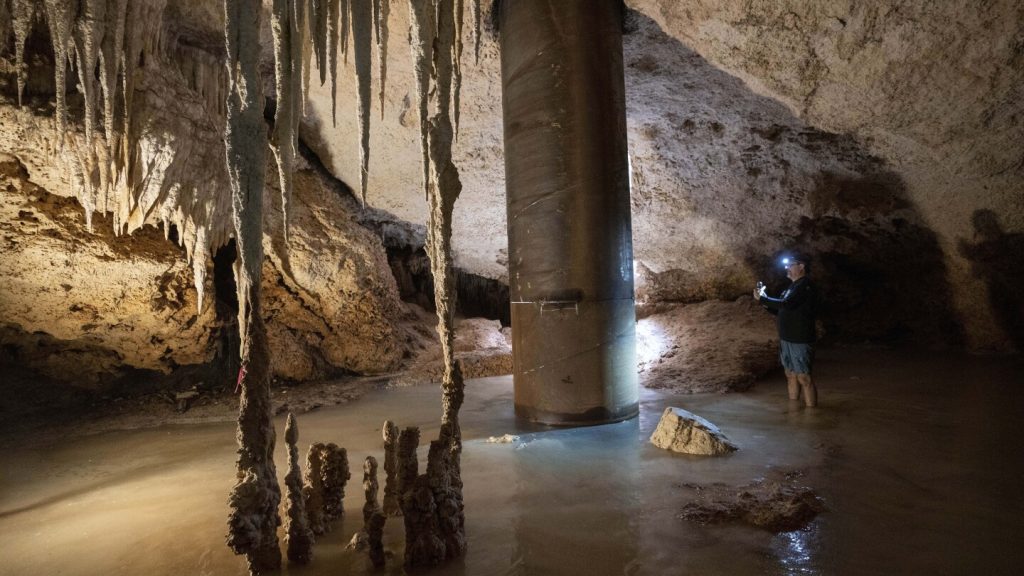ENVIRONMENTALISTS AND SCIENTISTS FIGHT BACKEnvironmentalists and scientists have been vocal in their opposition to the Maya Train project and its impact on the fragile cave system. The construction of the train has resulted in the destruction of millions of trees in the region, causing significant damage to one of the largest tropical forests in the Americas. The use of metal drills to embed steel pillars into the caverns has further exacerbated the situation, with stalactites breaking off and concrete spillage affecting the limestone ground. The presence of iron pollution in the water due to rust from the metal has also been documented, highlighting the extensive damage caused by the train project.
A LACK OF TRANSPARENCY AND ACCOUNTABILITYThe construction of the Maya Train has been characterized by a lack of transparency and accountability on the part of the Mexican government. President López Obrador has been accused of fast-tracking the project in order to fulfill political promises ahead of upcoming elections, disregarding environmental concerns and bypassing legal requirements. The government has ignored court orders, employed the military in construction, and distorted information in the name of “natural security.” This disregard for democratic processes and institutions has only intensified the backlash against the administration, with critics accusing López Obrador of undermining Mexico’s democratic norms.
A QUESTIONABLE LEGACY OF DEVELOPMENTLópez Obrador has framed the Maya Train project as a legacy of development for the neglected southeastern region of Mexico, positioning himself as a champion of the country’s marginalized communities. However, the rapid and destructive construction of the train has raised doubts about the true impact of the project on the local economy and environment. The administration’s failure to conduct a comprehensive environmental assessment before starting construction has further fueled concerns about the long-term consequences of the project. As the destruction of the cave system continues, the true legacy of the Maya Train remains uncertain.
A FRAGILE ECOSYSTEM AT RISKThe cave system in Mexico’s Yucatan Peninsula is not only a natural wonder but also a crucial water source for the region, serving as one of the largest aquifers in the country. The subterranean caves, rivers, lakes, and cenotes play a vital role in providing fresh water to the area, especially in the face of a deepening water crisis. The fragile ecosystem, formed over millions of years through the erosion of limestone by water, is now under threat due to the construction of the Maya Train. The destruction of stalactites and contamination of water sources highlight the immediate and long-term risks posed by the project to the region’s delicate ecology.
A DIVISIVE PRESIDENCYLópez Obrador’s presidency has been marked by controversy and division, with the Maya Train project serving as a focal point for critics of his administration. The populist leader’s disregard for environmental concerns, legal processes, and democratic institutions has fueled opposition to his government’s policies. The clashes between the administration and environmentalists, scientists, and the judiciary reflect broader tensions over the balance between development and conservation in Mexico. As López Obrador’s term comes to an end, the legacy of his presidency remains uncertain, with the Maya Train project standing as a symbol of the challenges facing the country’s future development and environmental sustainability.
A CALL FOR ACTIONAs the destruction of the cave system continues unabated, calls for action to protect Mexico’s natural heritage have grown louder. Environmentalists, scientists, and concerned citizens are urging the government to reassess the impact of the Maya Train project on the region’s ecosystems and water resources. They are calling for greater transparency, accountability, and adherence to environmental regulations in future development projects to prevent further damage to Mexico’s fragile ecosystems. The fate of the Yucatan Peninsula’s cave system, and the broader challenges of balancing development and conservation in Mexico, remain at the forefront of the national debate as the country grapples with the implications of the Maya Train project.


